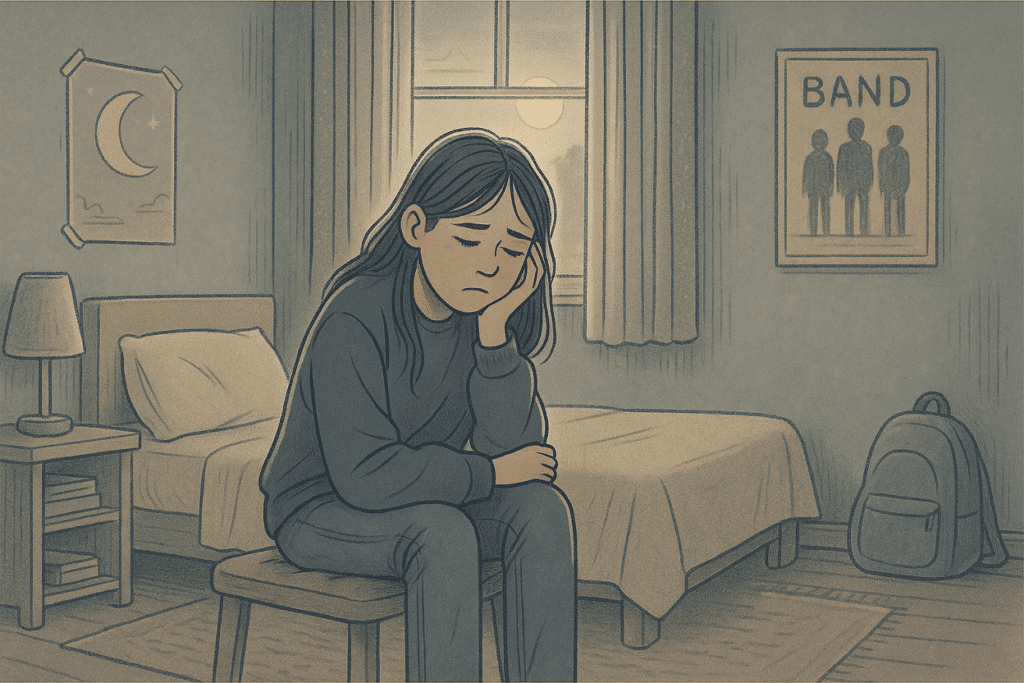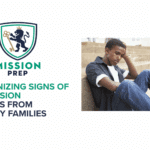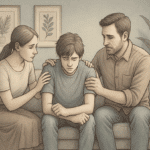Key Takeaways
- Teenage depression affects approximately 20% of adolescents before they reach adulthood, with symptoms that go beyond typical mood swings.
- Key warning signs include persistent sadness, withdrawal from activities, changes in sleep patterns, and declining academic performance.
- Depression in teens stems from multiple factors including genetics, brain chemistry, trauma, and social pressures.
- Early intervention from professional mental health care providers is required for clinical depression.
- Mission Prep Healthcare specializes in comprehensive depression treatment using evidence-based approaches customized specifically for adolescents. Our treatment programs provide supervision, intensive therapy, peer support, and personalized care plans that address each teen’s unique needs.
Understanding Teen Depression
Teen depression is a serious mental health condition characterized by persistent feelings of sadness, hopelessness, and loss of interest in activities that significantly interfere with a teenager’s daily functioning, relationships, and overall well-being.
Unlike typical adolescent mood swings or temporary sadness, teen depression involves prolonged emotional, behavioral, and physical symptoms that last for weeks or months and cannot be easily overcome through willpower or positive thinking.
Teenage depression is distinctly different from adult depression in several important ways. The adolescent brain is still developing, particularly in areas responsible for emotional regulation and decision-making.
This neurological development, combined with hormonal changes and increasing social pressures, creates a perfect storm where depression can take root and flourish if left unaddressed.
Mission Prep Healthcare specializes in mental health treatment for teens aged 12-17, offering residential and outpatient programs for anxiety, depression, trauma, and mood disorders. Our therapies include CBT, DBT, EMDR, and TMS, tailored to each adolescent’s needs.
With a structured, supportive environment, we integrate academic support and family involvement to promote lasting recovery. Our goal is to help teens build resilience and regain confidence in their future.
Depression Warning Signs in Teens
Emotional Changes
The emotional scene of depression in teenagers often includes persistent feelings of sadness, emptiness, or hopelessness that don’t seem to improve with time or positive experiences.
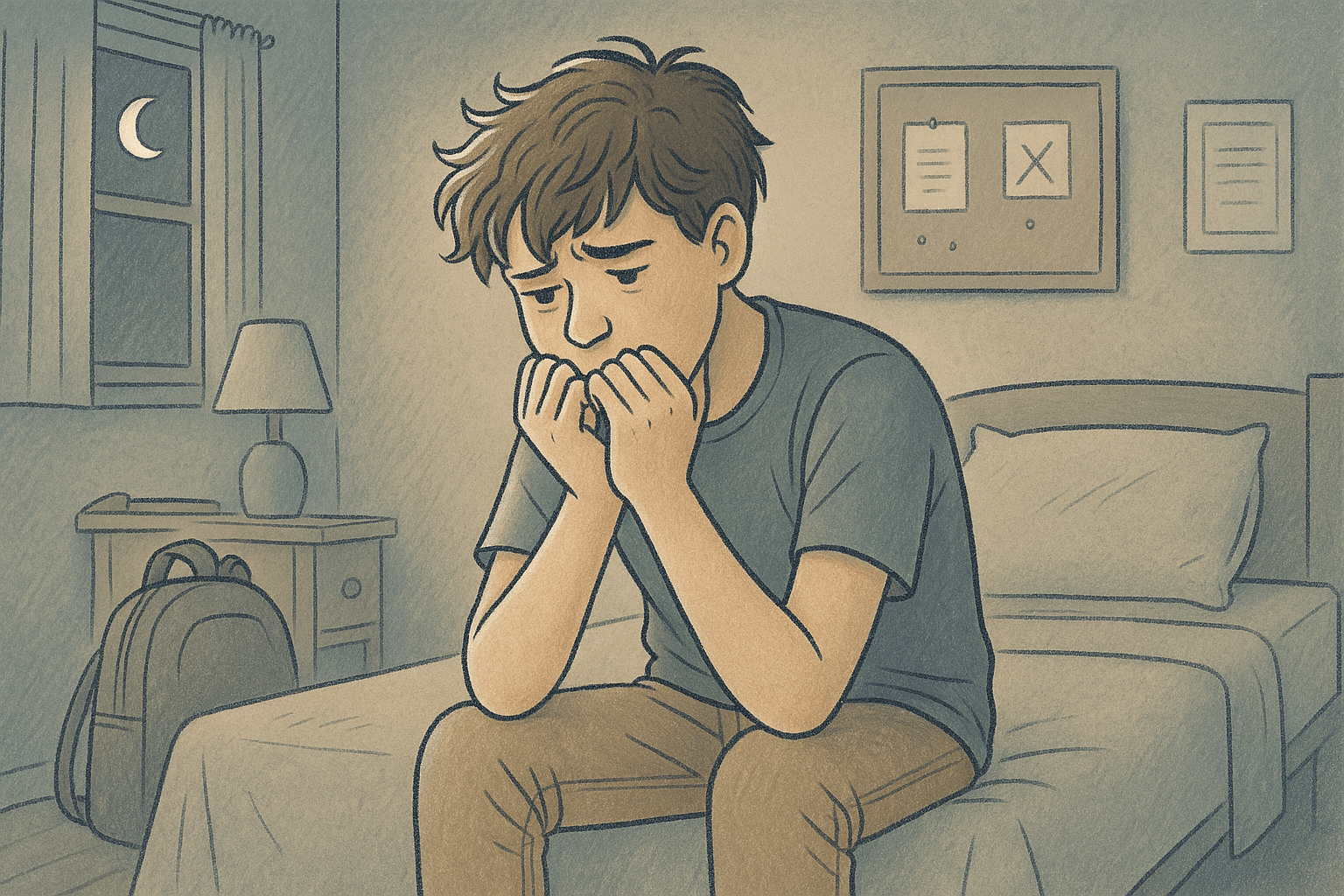
Teenagers might notice feelings of worthlessness or excessive guilt, even over minor matters.
Many depressed teens report feeling numb or disconnected from their emotions entirely, describing themselves as feeling “empty” or “dead inside.” These emotional shifts typically last for weeks or months rather than just a few days, distinguishing them from normal mood fluctuations.
Behavioral Shifts
When depression takes hold, teenagers often demonstrate noticeable changes in their daily behaviors and routines. They might start withdrawing from activities they have previously enjoyed, whether it’s sports, music, or spending time with friends.
This withdrawal isn’t simply changing interests; it’s a loss of ability to find joy or motivation in previously rewarding activities, a symptom clinicians call anhedonia.
Physical Symptoms
Depression manifests physically as well as emotionally. Sleep disturbances are extremely common, with some teens sleeping excessively (hypersomnia) while others battle insomnia, lying awake for hours despite feeling exhausted. Appetite changes frequently occur, with some teens experiencing significant weight loss or gain.
Additionally, physical complaints without clear medical cause like headaches, stomachaches, or general pain often accompany teenage depression.
Major Depression Triggers
Brain Chemistry
The adolescent brain undergoes significant development during the teenage years, particularly in areas responsible for emotional regulation, impulse control, and decision-making. These neurological changes can create vulnerability to mood disorders like depression.
Hormonal fluctuations during puberty also impact brain chemistry and emotional processing. The surge of hormones that accompanies adolescence affects neurotransmitter function and can trigger mood instability in genetically susceptible teenagers. This biological perspective helps explain why depression often emerges during the teenage years even without obvious external triggers.
Genetic Factors
Depression has a significant hereditary component, with research suggesting that a good percentage of depression risk is genetic. Teenagers with immediate family members who have experienced depression or other mood disorders face an elevated risk.
Genetic vulnerability doesn’t mean depression is inevitable. Rather, genetics create predispositions that may or may not manifest depending on environmental factors and life experiences. Understanding your family’s mental health history provides valuable context for recognizing and addressing depression in your child.
Social Media Pressure
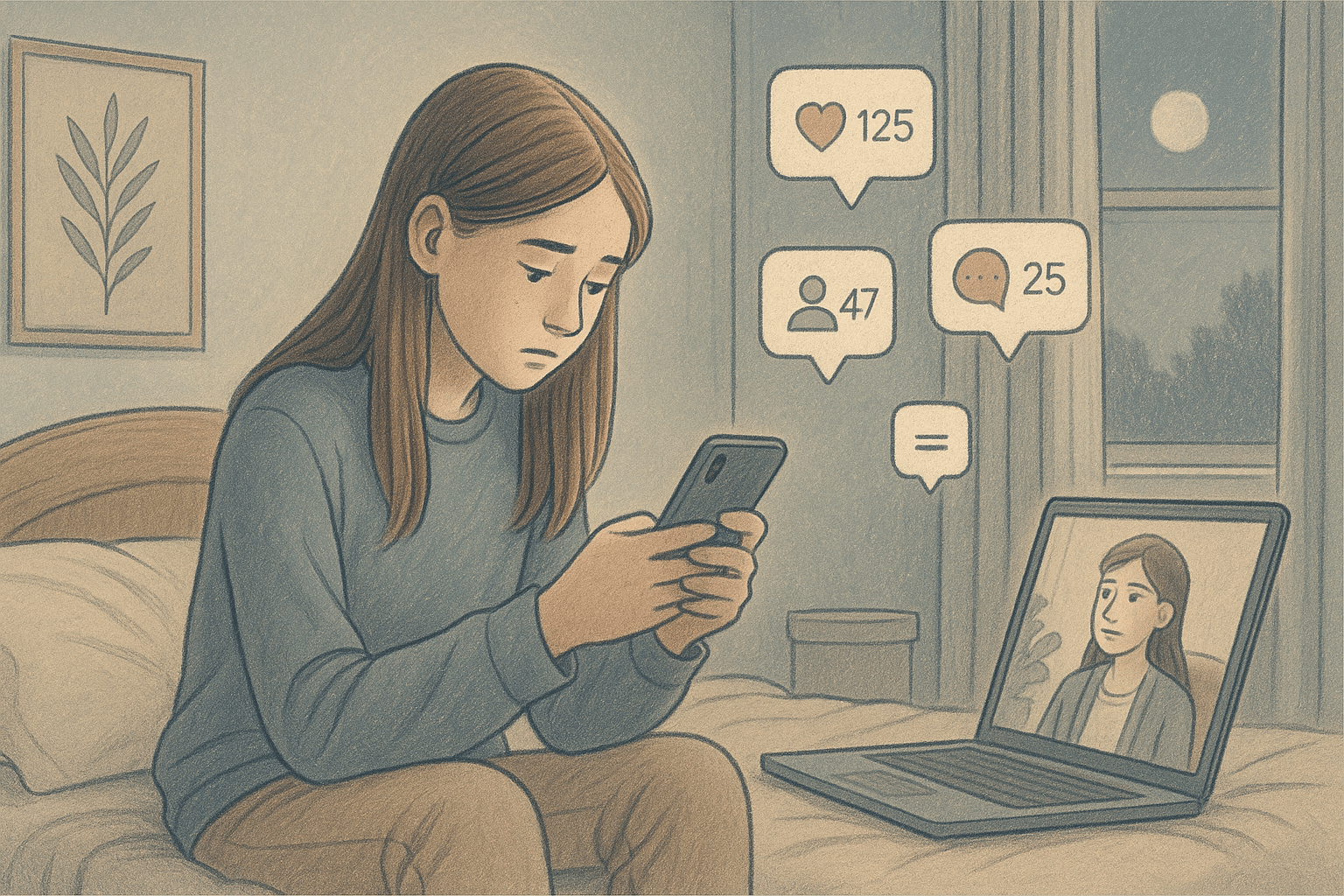
Today’s teenagers face unprecedented social pressure through constant digital connectivity.
Social media platforms create environments where teens continuously compare themselves to carefully curated versions of peers’ lives, fostering feelings of inadequacy and FOMO (fear of missing out).
The constant quest for validation through likes, comments, and followers can become an unhealthy measure of self-worth that contributes to depression when you inevitably fall short of impossible standards.
Trauma Impact
Traumatic experiences significantly increase depression risk in teenagers. Adverse events like physical or sexual abuse, witnessing violence, loss of a loved one, or experiencing severe illness can overwhelm a teen’s developing coping mechanisms.
Even less obvious traumas like parental divorce, moving to a new community, or losing a close friendship, can trigger depression in vulnerable teens. At Mission Prep Healthcare, we provide trauma-informed care that recognizes your teen’s experiences and addresses their impact on emotional well-being—without downplaying their significance.
When To Seek Help
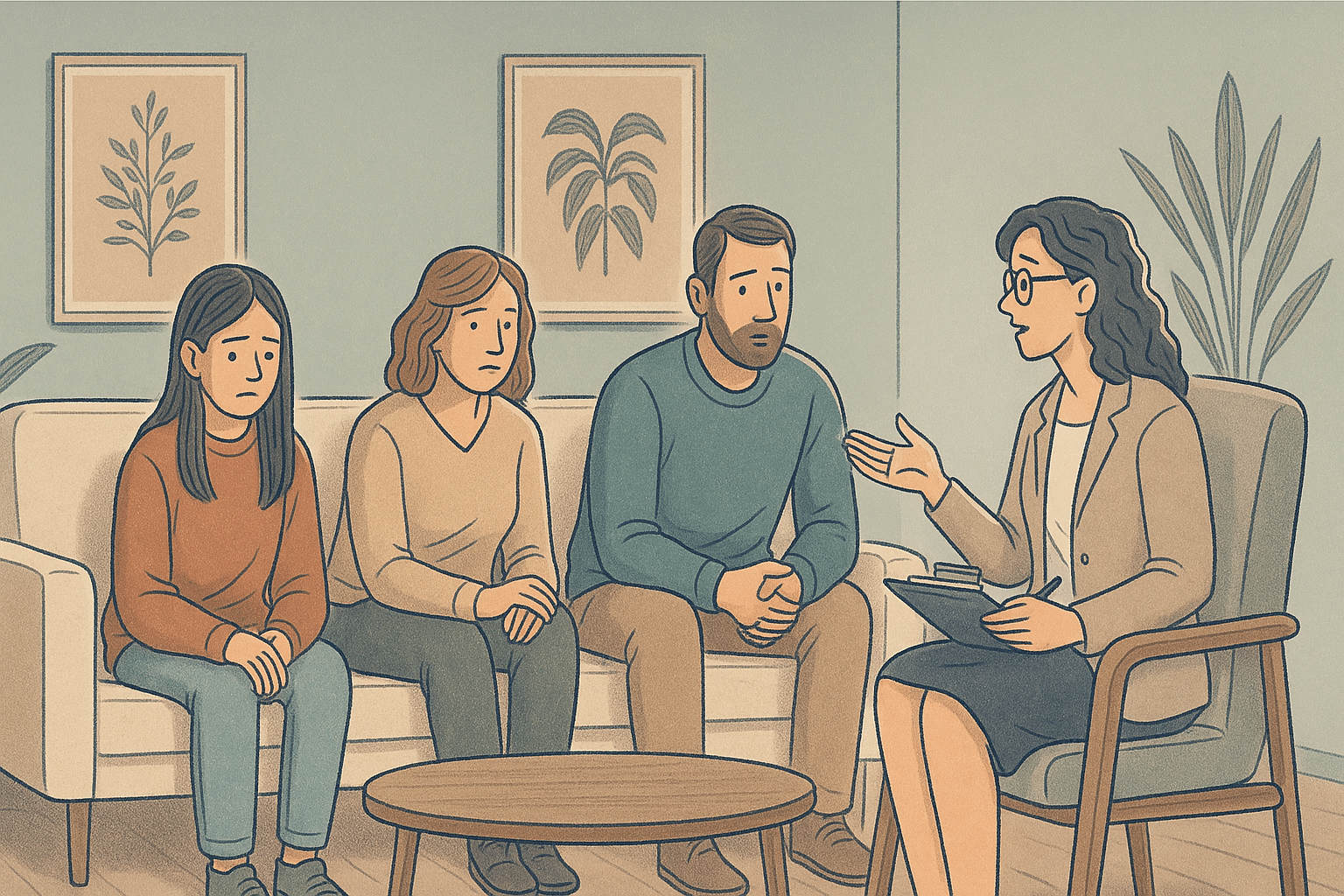
If you’ve noticed persistent changes in your child’s mood, behavior, or functioning that have lasted more than two weeks, professional evaluation is needed.
Crisis Warning Signs
Any suicidal statements or behaviors, whether seemingly casual comments, direct threats, or actual attempts warrant immediate professional evaluation. Other crisis warning signs include severe self-harm, or complete withdrawal from all activities and relationships also indicate urgent need for professional intervention.
If you observe these warning signs, contact a mental health crisis service, visit an emergency room, or call the National Suicide Prevention Lifeline at 988 immediately.
Professional Options
Most primary care providers can conduct initial depression screenings and provide referrals to mental health specialists when needed. Mental health specialists offer more comprehensive evaluation and treatment options. Psychiatrists can prescribe medication when appropriate, while psychologists, licensed counselors, and clinical social workers provide various forms of therapy.
At Mission Prep Healthcare, we offer specialized adolescent mental health services led by professionals experienced in treating teenage depression with approaches tailored to the unique needs of young people.
Treatment Approaches for Teen Depression
Therapy Types
Cognitive Behavioral Therapy (CBT) stands as one of the most effective therapeutic approaches for teenage depression. This evidence-based treatment helps your teenager identify and challenge negative thought patterns while developing healthier coping behaviors.
Other effective therapy approaches include Interpersonal Therapy (IPT), which focuses on improving relationship skills and resolving social conflicts, and Dialectical Behavior Therapy (DBT), which teaches emotional regulation, distress tolerance, and mindfulness.
Medication Information
Antidepressant medications may be recommended for moderate to severe depression, particularly when symptoms significantly impair functioning or don’t adequately respond to therapy alone.
Selective Serotonin Reuptake Inhibitors (SSRIs) are most commonly prescribed for teenagers with depression. At Mission Prep Healthcare, we approach medication decisions carefully, weighing potential benefits against possible side effects and monitoring closely during treatment.
Family Support Role
Families play a crucial role in depression treatment success. We educate families about depression, challenging misconceptions and reducing stigma that might prevent teens from fully engaging in treatment.
Learning specific communication strategies and boundary-setting approaches helps you better support your child’s recovery journey while maintaining appropriate expectations and structure.
Mission Prep’s Approach to Teenage Depression Recovery
At Mission Prep Healthcare, we understand that depression in adolescents requires specialized care that addresses the unique developmental, emotional, and social needs of young people during this critical life stage.

Our residential treatment programs provide the intensive support that many depressed teenagers need to achieve lasting recovery.
Through evidence-based therapies, 24/7 clinical supervision, and personalized treatment planning, we help teens develop the coping skills and emotional resilience necessary for long-term mental wellness.
Our approach recognizes that teenage depression affects not just the individual but entire families, which is why we integrate family therapy and education into our comprehensive treatment model.
The teenage years should be filled with growth, discovery, and hope for the future. When depression threatens to derail this important developmental period, Mission Prep stands ready to provide the specialized care your child deserves.
Frequently Asked Questions (FAQ)
Can teenagers outgrow depression?
While some milder forms of teenage depression may improve without treatment as adolescents mature and life circumstances change, clinical depression rarely resolves completely without appropriate intervention. Depression that goes untreated often worsens over time and increases risk for recurring episodes throughout life.
Is teen depression different from adult depression?
Yes, teenage depression often manifests differently than adult depression. While adults typically express sadness as their primary symptom, teenagers more commonly display irritability, anger, and extreme sensitivity to criticism. Teens also tend to exhibit more behavior problems, academic difficulties, and social withdrawal compared to depressed adults.
Are antidepressants safe for teenagers?
Antidepressants can be safe and effective for teenagers when properly prescribed and monitored by experienced healthcare providers. However, they require careful consideration due to some important differences in how adolescents respond to these medications compared to adults.
The FDA has placed a “black box warning” on antidepressants for patients under 25, noting a small increased risk of suicidal thoughts or behaviors, particularly during the first few weeks of treatment or dose adjustments. This doesn’t mean antidepressants shouldn’t be used, but rather that close monitoring is essential, especially during treatment initiation.
Can school counselors diagnose depression?
Most school counselors cannot formally diagnose depression, as this typically requires a licensed mental health professional like a psychologist, psychiatrist, or clinical social worker.
However, school counselors play a valuable role in identifying warning signs, conducting initial screenings, providing supportive counseling, and connecting students and families with appropriate community resources for formal assessment and treatment.
How does Mission Prep Healthcare approach teenage depression treatment?
Mission Prep Healthcare provides specialized residential and outpatient treatments for adolescents struggling with depression.
Our comprehensive approach includes 24/7 supervision, intensive individual and group therapy, peer support, and personalized treatment plans. We focus on building healthy coping mechanisms, addressing underlying trauma, and involving families in the healing process.


